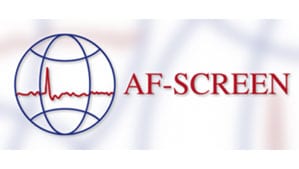Three years after the original roadmap for atrial fibrillation (AF) organized by the World Heart Federation, leaders in the global AF community, including PHRI Senior Scientist Jeff Healey, have released an update.
Published this week in the Global Heart Journal (full text), the 2020 AF roadmap notes that “since publication of the AF Roadmap in 2017, there have been many technological advances including devices and artificial intelligence for identification and prediction of unknown AF, better methods to achieve rhythm control, and widespread uptake of smartphones and apps that could facilitate new approaches to healthcare delivery and increasing community AF awareness.”
The paper’s first author, Ben Freedman, of the Heart Research Institute (Sydney, Australia) is on the steering committee, with Jeff Healey, of the AF-SCREEN International Collaboration.

Jeff Healey (smartphone AF detection)
As well as opportunities for new digital technologies to overcome barriers in screening, diagnosis and monitoring for AF, the 2020 update includes:
- The global AF burden and country estimates; primoridal and primary AF prevention
- Identifying roadblocks and strategies to overcome them
- Rate-control and rhythm-control strategies
- Interventional prevention of cardioembolism by left atrial appendage occlusion (LAAO)
- Anticoagulant therapy to prevent AF-related stroke
- The role of AF in heart failure and dementia/cognitive decline
The WHF will go forward in support of the updated AF roadmap with: CVD scorecards (country-level data identifying gaps in AF patient care); national roundtables; World Heart Day (public advocacy); and with continuing research through the WHF’s Salim Yusuf Emerging Leaders Programme.
Earlier this year, Jeff Healey was senior author on Screen-AF– looking at a micro-chest patch for AF detection (a multicentre randomized trial coordinated by PHRI) published in JAMA Cardiology.
He was also among the authors of a comprehensive overview of Research Priorities in Atrial Fibrillation Screening, the result of a series of workshops held by the National Heart, Lung, and Blood Institute (NHLBI).



